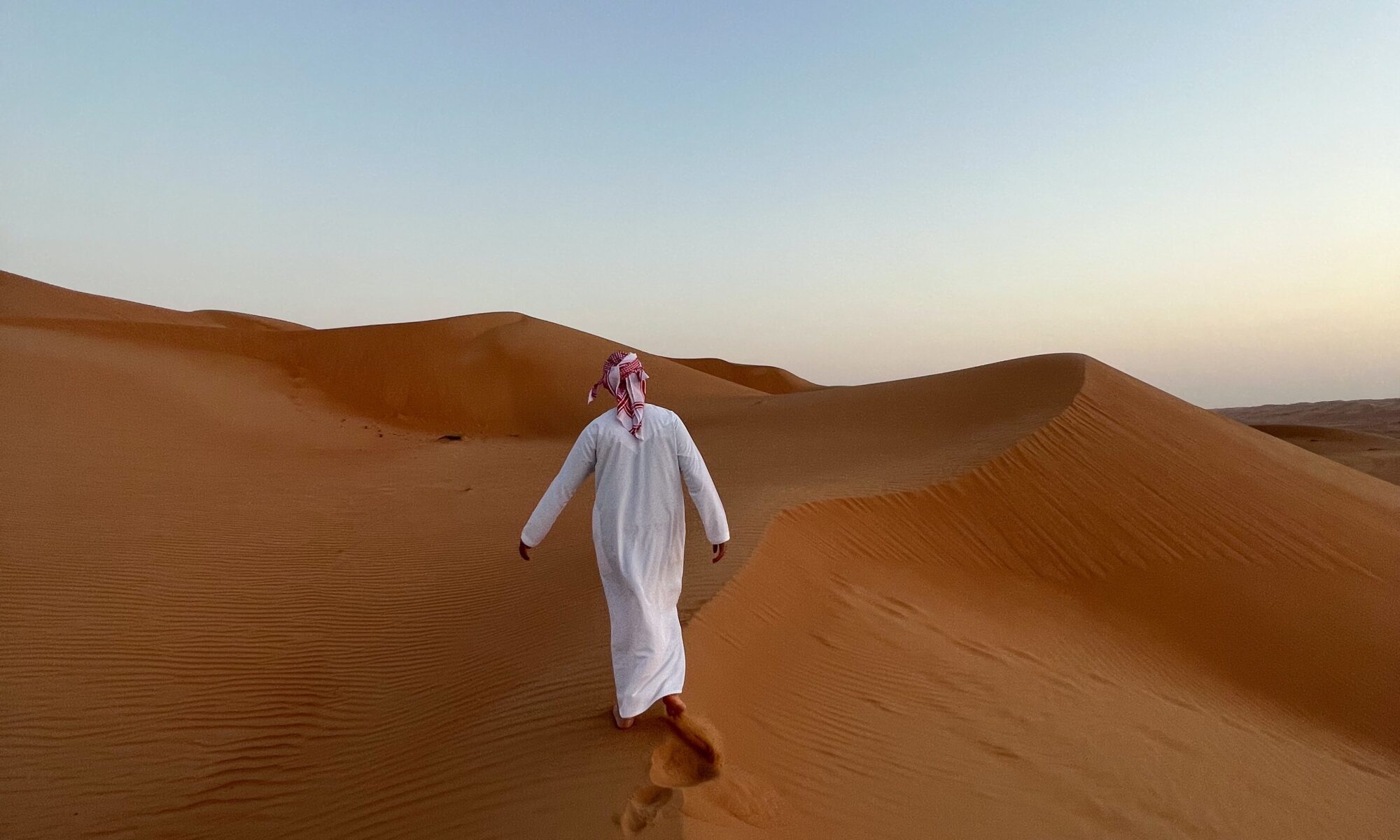What do the heavy metal band Guns N’ Roses, the Hebrew Bible, and the Chasidic masters Rebbe Nachman and Simcha Bunam all have in common? They each beg us to ask and answer the question, “Where do we go now?” As we shall see, this question is as old as God and man.
The Koan of a Lifetime
And God said to Abram, “Go Go—lech lecha—from your land, from your birthplace and from your father’s house, to the land that I will show you. I will make of you a great nation and I will bless you and make your name great, and you shall be a blessing. I will bless those who bless you and curse him that curses you. And all the families of the earth shall bless themselves by you.” Abram went forth as God had spoken to him, and Lot went with him. Abram was seventy-five years old when he left Haran. Abram took his wife Sarai and his brother’s son Lot, and all their treasured possessions they had amassed, and the life they had made in Haran. And they set out for the land of Canaan. (Genesis 12: 1-5a; translation by author)
For as long as I can personally remember, I have lived with the opening lines from Parashat Lech Lecha—the Biblical lectionary reading where the koan above is taken from—as my genjokoan, my personal lifelong koan.
In the Jewish tradition, when children reach the age of Bar- or Bat-Mitzvah and undergo the rites of passage into adulthood, each child reads from the Biblical lectionary reading—or parashah—that was read by Jews across the world during their birth week.
In my case, I was born the week Abraham hears the Divine call in the lectionary reading called Lech Lecha (Genesis 12:1-17:27). I have felt compelled to experience it—and these opening lines, in particular—as a lifelong koan to practice with. Whether I like it or not—I most often do—I have been gripped by them ever since.
Ordained by God
In the Zen Buddhist tradition, when a practitioner is called to ordain as a priest, they undergo a ceremony called shukke tokudo. This phrase in the Japanese can be translated as “leaving home, attaining the way.” Yet do we ever leave home? And do we need to leave “home” to attain the Way?
This too is the message in Abraham’s Divine call to leave home. It is a process that we all—in some way or another, at some point in our lives—are each called to do.
Abraham heeds the call to leave all that is known to him to embrace all that is foreign and completely unknown. Step by step, Abraham and his family traverse the deserts from Haran in present day Turkey to the land of Canaan in present day Israel.
With each step, Abraham sheds attachments and all conceptions to the life that he had so far lived. He leaves the comfort of his motherland, his father’s house, and embarks on the hero’s journey to find himself.
The great 13th century founder of Soto Zen Buddhism, Eihei Dogen Zenji, describes our journey and life this way:
To study the Way is to study oneself.
To study oneself is to forget oneself.
To forget oneself is to perceive oneself as all things.
To realize this is to cast off the body and mind of self and others. (“Genjokoan” in the Shobogenzo)
Go to Yourself (Lech Lecha)
For millennia, Jewish rabbis and scholars have asked why the Hebrew Bible uses the strange, and seemingly unnecessary, phrase “lech lecha” to open this passage. Telling Abram to “Go Go” [“Lech lecha”] is overkill. In this koan, the same word is repeated twice with no clear and obvious reason.
In the Kabbalah, the Jewish mystical tradition, Moses ben Mordecai Zacuto (1625-1697) offers one explanation.
God said to Abram, “Go forth.” God said to Abram, “Go to your self, know your self, fulfill yourself” This verse is addressed to every person. Search and discover the root of your soul. So that you can fulfill it and restore to its source, its essence. The more you fulfill yourself, the closer you approach your authentic self.
Simcha Bunam of Pschische (1765-1827), a later Chasidic master teaches:
Go for yourself. He said, “Lech lecha”, [which really means] “for yourself.” The meaning is that each person should test themselves to see if their way may be improved…. Each person must sense for themselves what level they are on and [whether] they need to do anything.
The great Rebbe Nachman of Breslav an 18th century Chasidic master and a great-grandson of the founder of Chasidism, the Baal Shem Tov (1698-1760; also called the Besht), teaches that “Abraham is called ‘the volunteering heart’ because he offered his heart to God” and offers this explanation:
Lekh lekha (literally, “Go to yourself”) means that wherever you go, you must always look “to yourself”— to the point of truth within you. Each individual has his own point of truth. To find it, he must leave behind his “land”— these are his material desires, for each land has its own material pursuits, some for money, others for immorality, etc. He must leave behind his “birthplace”— these are his physical desires. And he must leave behind his ancestry— his thoughts of receiving honor and respect by others. All these deter a person from finding the truth. Then he will merit to the “Land”— to holiness.
And in much more contemporary times, the newly ordained Rabbi Batya Ellinoy teaches that this Lech lecha, this “Go Go” is not only a command to “go forth… to yourself…for yourself”, but one also to go “beyond yourself.”
As it’s written in the Heart Sutra, “Gate Gate Parasamgate Parasamgate Bodhisvaha!” “Beyond, beyond, beyond beyond, beyond beyond, Amen!”
Chosen by God
Like a middle school at their first dance, we all want to feel chosen. In fact, it is one of the most natural yearnings there is in all of life. It is entirely normal and appropriate to wish to feel belonging, accepted, and chosen.
The Jewish tradition teaches that Abraham is the father of monotheism. God chooses Abraham to be the father of a great nation to be blessed of whom from who all of the families of the earth shall be blessed.
Abraham is chosen! We must remember this! Who does not want to feel like others have their back? Who does not yearn for the support and inspiration of those they love most in this world… and beyond!
Only from the comfort, safety, and security of being chosen can Abraham prepare himself and make the journey, putting left foot in front of right, for hundreds and hundreds of miles.
I am reminded of the passage from the New Testament in the Book of Luke. In a way, Jesus instructs his followers and calls on each and every one of them to similarly leave—and come—home.
Now large crowds were traveling with him, and he turned and said to them, “Whoever comes to me and does not hate father and mother, wife and children, brothers and sisters, yes, and even life itself, cannot be my disciple. Whoever does not carry the cross and follow me cannot be my disciple. (Luke 14:25-27; NASB)
The Land that I Will Show You
I can only imagine Abraham’s terror. “Wait! I hear something! A voice?! What the heck is going on?! Am I going crazy? Hearing voices? Who is talking with me?! Who are You?!”
It takes great effort and practice to listen, to truly listen. It is the essential teaching of Judaism, isn’t it?! Shema! Listen! Pay attention!
The 18th century Chasidic master Rabbi Schneur Zalman of Liadi (1745-1812; also called the Alter Rebbe) teaches us about Abraham’s call and home leaving. “There, in the land, on this earth, I will show you your essence.” The land God shows Abraham, the land God shows to us, and Home is no other than here! And now! Just this!
Abraham’s journey—our journey—may feel like one of millions and billions of miles and lifetimes, though it begins just here and now. Always!
Abraham is called to leave his home and all that he knows to travel to the land that the Divine has still to reveal. Abraham is called—as we are called—to only go straight! Yet how does one “Go straight on the narrow mountain road with 99 curves?” (Miscellaneous Koan collection in the Sanbo Kyodan School of Zen). Life consistently throws us curveballs.
The contemporary Korean Zen Master Seung Sahn used one particular teaching phrase—among others—throughout his teaching life, “Only go straight!”
If you want to get out of the ocean of suffering, only one kind of compass is necessary: your don’t-know compass. It is always inside you. When you use this, then you find that your correct direction always appears clearly in front of you, from moment to moment. So I hope from moment to moment you only go straight, don’t know, which is clear like space, try, try, try for ten thousand years, nonstop, get enlightenment, and save all beings from suffering.
A Promised Land
Leaving home is not easy. It never is! We may think that amassing a great fortune and taking all of our treasured possessions along with us may assist us, but does it? We may even see our wives, husbands, and family members as our treasure and take them along on our journeys, but whose journey must we transverse? Whose path is set before us?
Loosening our grip and illusions of safety in our absolute allegiance to our sense of Me, My, Mine exposes us to the Truth of our lives, and in an ironic way, to an experience of genuine safety, joy, and chosenness unlike any other. This is the great promise we hear echoing still today from the Hills of Haran! And in every place and throughout all time!
In the Tibetan Buddhist tradition, Gyelsay Togmay Sangpo wrote the Thirty-Seven Practices of a Bodhisattva in the 14th century. These 37 short verses epitomize the quintessential practice of a Bodhisattva, a person who delays entering Nirvana until they first assist all others in entering there first before even him or herself. The second verse of the 37 Practices is particularly poignant and resonant with Abraham’s call:
The practice of all the bodhisattvas is to leave behind one’s homeland,
Where our attachment to family and friends overwhelms us like a torrent,
While our aversion towards enemies rages inside us like a blazing fire,
And delusion’s darkness obscures what must be adopted and abandoned.
Whether you are Abraham, Sarai, or Lot, a Chassidic master, Axl Rose or another lead singer for a heavy metal band, or even—and especially—you, where do you go now? Where is the land that the Divine will show us. Where is your promised land? Lech lecha! Go to yourself! Go for yourself! Go beyond yourself! Just watch your step, ok?!
Next Steps
As always, if you are interested in learning more about Jewish Mindfulness Meditation or how to create a more meaningful spiritual path for you and your loved ones, please make sure to sign up and click the “Stay Connected Now!” button below!
Mindful Judaism is pleased to offer daylong Jewish meditation and mindfulness retreats, shabbatons (weekend workshops), and other live and in person events throughout California and beyond.
If you are interested in bringing Mindful Judaism to your community, synagogue, or meditation group, please contact us at adam@mindfuljudaism.com for more information and to make arrangements.
Adam Fogel
www.mindfuljudaism.com

